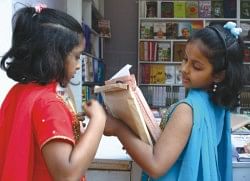| Home - Back Issues - The Team - Contact Us |
 |
| Volume 10 |Issue 08 | February 25, 2011 | |
|
|
Impressions Thoughts on Ekushey Book Fair 2011 Zahidul Naim Zakaria As a child and a teenager, my visit to the Ekushey Book Fair was a family tradition. I was never a bookworm, but reading detective/mystery novels (especially Shatyajit Roy's Feluda) used to be one of my most favourite pastimes. My sister, on the other hand, was fonder of Humayun Ahmed's works. My family had always encouraged me to read and my father spent tens of thousands (which was a lot of money back in the day) on books that my sister and I wanted to read, and I never truly understood his reasons to spend that kind of money on books until much later.
Education gives us a lot of hints about enlightenment, but it hardly ever is enough to set our minds free. Without books to inspire questions from deep within us, without fictional characters and circumstances to ignite our imagination, general education alone would not get us very far as individuals or as professionals. I was lucky that my education was enriched at home and that my family created the right environment within which I could grow and my mind could think. I was even luckier that the world of visual entertainment had not taken hold on me as a child. But perhaps the same is not true for the Bangladesh's middle class today. On my visit to the Ekushey Book Fair this year, as I roamed about in search of good reads, I observed something different. Although the fair had grown larger and more diverse with time, the faces of the crowd had changed. I could feel the difference. I felt that almost everyone at the fair were either from low income families of Dhaka or out-of-towners, which certainly is an encouraging trend. I spoke to some families at the fair, and I realised that my gut feeling was true. But where did the middle class and the rich people go? The answer was obvious. But the fatality of it would not have struck me so profoundly had I not seen it with my own eyes. With computers, the internet, and gaming consoles, children have little attraction towards books nowadays. Families with higher income, perhaps without even fully realising it, have replaced reading books with technologically advanced forms of visual entertainment. I'm sure most people will refuse to say this out loud since it simply doesn't feel right, but such behaviour by a large part of our community simply deems books as inferior, since with higher ability to pay, people would rather switch to alternative means of recreation which they perceive to be superior. Economies in transition (in terms of growth and income) often face such fallacies, and it should be up to those who know better to guide children back to the right path. Reading allows one to become imaginative to the extent that he or she can begin to create. Without this experience, children who only watch movies and television shows and play games will not be able to create literary pieces, and will always be stuck on the consumption end of the creative cycle. Those who never read were deprived of the joy of being lead towards visualising a scene, a context; deprived of the opportunity of filling gaps with their own interpretations. Reading books was the most important part of my education as a child; something that I fear will be missing from many of today's young people as they grow up. On my way home from the fair, I felt terribly sad thinking what children of privileged families were missing out on in Dhaka. What depressed me even more was realising the fact that little could be done now to make well-off children of Dhaka understand how their choices may be limiting their own future abilities. Copyright
(R) thedailystar.net 2010 |
